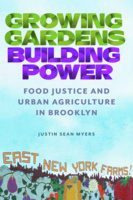The Dual Enrollment Kaleidoscope
Reconfiguring Perceptions of First-Year Writing and Composition Studies
The American Historical Imaginary
Contested Narratives of the Past
Stained Glass Ceilings
How Evangelicals Do Gender and Practice Power
This book speaks to the intersection of gender and power within American evangelicalism by examining the formation of evangelical leaders at Southern Baptist Theological Seminary and Asbury Theological Seminary, arguing that evangelical culture upholds male-centered structures of power even as it facilitates meaning and identity for both men and women.
Powerful Devices
Prayer and the Political Praxis of Spiritual Warfare
Port Newark and the Origins of Container Shipping
On Transits and Transitions
Trans Migrants and U.S. Immigration Law
Making Choices, Making Do
Survival Strategies of Black and White Working-Class Women during the Great Depression
Living Ruins
Native Engagements with Past Materialities in Contemporary Mesoamerica, Amazonia, and the Andes
In the Shadow of Tungurahua
Disaster Politics in Highland Ecuador
In the Shadow of Tungurahua is about villagers learning to co-live with an active volcano while adapting to disasters largely produced by a protean state’s attempts to settle and govern its rural margins. It’s also about people responding creatively to cooperate, confront hardships, and craft new futures through locally derived disaster recovery projects and politics.
Growing Gardens, Building Power
Food Justice and Urban Agriculture in Brooklyn
Across the United States marginalized communities are organizing to address social, economic, and environmental inequities through building community food systems rooted in the principles of social justice. But how exactly are communities doing this work, why are residents tackling these issues through food, what are their successes, and what barriers are they encountering? This book dives into the heart of the food justice movement through an exploration of East New York Farms! (ENYF!), one of the oldest food justice organizations in Brooklyn.
First-Generation Faculty of Color
Reflections on Research, Teaching, and Service
Through a comprehensive collection of personal narratives, First-Generation Faculty of Color: Reflections on Research, Teaching, and Service is the first book to examine faculty diversity through the experiences of racially minoritized faculty who were also the first in their families to graduate college in the United States.
First-Generation Faculty of Color
Reflections on Research, Teaching, and Service
Through a comprehensive collection of personal narratives, First-Generation Faculty of Color: Reflections on Research, Teaching, and Service is the first book to examine faculty diversity through the experiences of racially minoritized faculty who were also the first in their families to graduate college in the United States.
Drilled to Write
Becoming a Cadet Writer at a Senior Military College
Aztec Antichrist
Performing the Apocalypse in Early Colonial Mexico
1980
America's Pivotal Year
Understanding Disaster Insurance
New Tools for a More Resilient Future
Understanding Disaster Insurance is a useful guidebook for policymakers, innovators, students, and other decision makers working to secure a resilient future—and anyone affected by wind, fire, rain, or flood.
William Faulkner Day by Day
A fascinating and in-depth exploration into the life of one of America’s greatest authors
Oaxaca in Motion
An Ethnography of Internal, Transnational, and Return Migration
An expansive survey of the cultural fluctuations experienced by Oaxacan migrants both inside and outside of Mexico.
Joyce without Borders
Circulations, Sciences, Media, and Mortal Flesh
Debating American Identity
Southwestern Statehood and Mexican Immigration
Bountiful Deserts
Sustaining Indigenous Worlds in Northern New Spain
Set in the arid lands of northwestern Mexico, this book foregrounds the knowledge of Indigenous peoples who harvested the desert as bountiful in its material resources and sacred spaces. Author Cynthia Radding uses the tools of history, anthropology, geography, and ecology to re-create the means of defending Indigenous worlds through colonial encounters, the formation of mixed societies, and the direct conflicts over forests, grasslands, streams, and coastal estuaries that sustained wildlife, horticulture, foraging, hunting, fishing, and—after European contact—livestock and extractive industries. She returns in each chapter to the spiritual power of nature and the enduring cultural significance of the worlds that Indigenous communities created and defended.
Baseball and Cultural Heritage
This is the first volume to explore the understudied side of baseball—how its heritage is understood, interpreted, commodified, and performed for various purposes today, ultimately showing how the performance of baseball heritage can reflect the culture and heritage of a nation.
Every Wrong Direction
An Emigré’s Memoir
Every Wrong Direction recreates and dissects the bitter education of Dan Burt, an American émigré who never found a home in America. Burt's memoir follows his wanderings through three countries and seven cities over 43 years, culminating in his emigration to Britain, the country where he finally found a home.
State of Defiance
Challenging the Johns Committee's Assault on Civil Liberties
My Haunted Home
Stories
Maybe We'll Make It
A Memoir
Life in a Mississippian Warscape
Common Field, Cahokia, and the Effects of Warfare
Analyzes Mississippian daily life at Cahokia’s environs during wartime
























